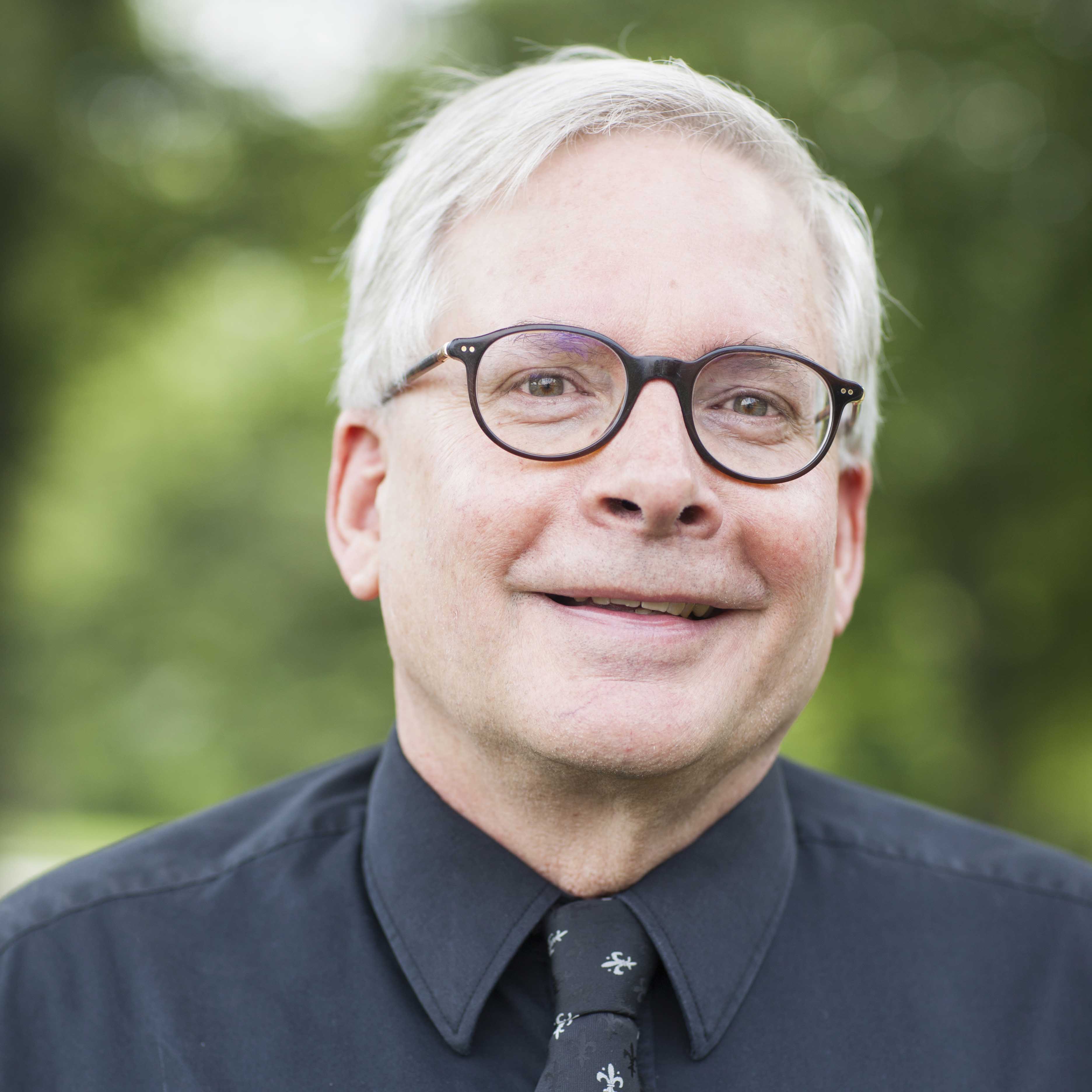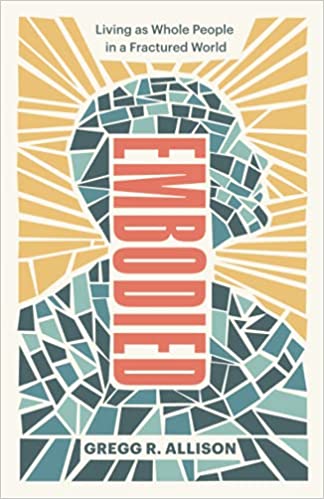An Author Interview from Books At a Glance
Would you like to watch the video interview or listen to the audio? Sign-up today for access to these features and more.
Zaspel:

 Greetings, I’m Fred Zaspel and welcome to another Author Interview here at Books At a Glance. Today we’re talking to two authors, Drs. Gregg Allison and John Kleinig, who each have written a book on a similar subject. Gregg Allison’s book is Embodied: Living as Whole People in a Fractured World, and John Kleinig’s book is Wonderfully Made: A Protestant Theology of the Body.
Greetings, I’m Fred Zaspel and welcome to another Author Interview here at Books At a Glance. Today we’re talking to two authors, Drs. Gregg Allison and John Kleinig, who each have written a book on a similar subject. Gregg Allison’s book is Embodied: Living as Whole People in a Fractured World, and John Kleinig’s book is Wonderfully Made: A Protestant Theology of the Body.
Gregg, John, great to have you with us!
Kleinig:
Thank you.
Allison:
Thanks, Fred.
Zaspel:
First, if you would each of you take a turn and tell us briefly what your book is about and what the contribution is that you hope to make.
Allison:
First, I want to express my appreciation to John for a book that has many similarities to mine. We operated independently but I would pause and smile as I read his book because there are so many similarities. It gives confirmation that God is bringing together several many people to write on this topic of human embodiment. My book starts with the provocative statement, “I am my body.” I want to focus on the fact that the proper state of human existence is embodiment.
My book takes on Gnosticism and gnostic tendencies which elevate the spirit or soul and denigrate or demolish human embodiment. To Gnostics, the material aspect of human nature is simply not important perhaps even evil. I talk about the created, gendered, particular, social, and sexual body. Then I apply this framework to matters like physical discipline. Battling against sins of the body like lust, sloth, and gluttony. I apply it to worship, clothing, suffering, healing, and matters like that.
Kleinig:
I can say ditto to much of that. However, I will give two quotations which summarize what I do in the book. The first is what Paul says in Galatians 2:20, “I have been crucified with Christ. It is no longer I who live, but Christ who lives in me. And the life I now live in the flesh I live by faith in the Son of God, who loved me and gave himself for me.” The life that I live in the flesh part is telling. Regarding life in the flesh or material world, we live in the flesh both as human beings and as Christians. From beginning to end our life is in the body. The second quotation comes from C.S. Lewis, he says in connection with sexuality, “Christianity is foremost the only one of the great religions that thoroughly approves the body which believes that matter is good. That God himself once took on a human body. That some kind of body is going to be given us even in heaven. It is going to be an essential part of our happiness, our beauty, and our energy.”
I begin with the fact that we have two mindsets on the body. On one hand, you have the dissatisfaction of the body. Most are dissatisfied with their bodies and would trade them in or change them. I wanted to shift from the way we view our bodies to the way that God views them. From Scripture, I show how God highly regards not just us but our bodies. I wanted to give a positive vision of the body. I touch on that in the introduction and then I deal with the created, redeemed, spiritual, sanctified, sexual, and the spousal parts of the body. I try to draw it all together. We are humans made in his image, but more importantly, I focus on how God regards us as those who are in Christ.
Zaspel:
Maybe just in broad terms, what is the significance of our embodiment? We’re not spirit beings merely but embodied being with both body and soul. What is the significance of this for Christians in particular?
Allison:
We are not only our bodies but more than that. John brings this out in his book as well. We are a body, soul unity. There is a material and immaterial aspect. So much attention has been paid to the immaterial reality. This includes our souls, spiritual disciplines, and saving souls. I try to shift the focus and talk about the embodiment and what it means to live before God in Christ as embodied image-bearers redeemed by the Lord.
Kleinig:
The danger is we reduce that we are both body and soul. We want to focus on the unity of the whole person. The focus in Scripture particularly if you look at it in the Old Testament is God dealing in a whole way with the whole person. This includes how he deals physically with our bodies.
Zaspel:
What is the relation of body and soul?
Allison:
For me in this life they are so inextricably interwoven I do not know what pertains to the soul and body. They are imminently connected. We are ensouled bodies or embodied souls. John’s point is that God deals with us holistically and therefore that is how I would like to approach this.
Kleinig:
In summary, God knows this answer and we do not. However, data is coming in from surprising sources. One of the problems we have had in the West is to identify soul with mind. The data says we cannot separate the mind from the body. We think with our bodies. We perceive with our minds not just our senses. They are closely interrelated. The fact you can use the same word in different ways in different contexts is elementary linguistics. By soul, the most helpful thing to say is that it has to do with myself. I am a person. The word body is straightforward, but body includes mind. The body is animated by life power. The spirit can be taken in more than one or two ways. You can refer to angels and demons, the Holy Spirit, or the human spirit. This is the living being physically that is animated by the Holy Spirit.
Zaspel:
How is all this related to our creation in God’s image?
Kleinig:
We have had this problem in Christendom right from the early church. This is the idea or notion that only the soul is created in God’s image. This is true but not the whole truth. The whole person is created in God’s image. Humans are to be fruitful and multiply and subdue the earth. This is all physical stuff. There is one part of Genesis that has not been considered. This is the introduction to the story of the flood. God unleashes the flood because violence has taken over the earth. God says, “whoever sheds blood of men, his blood shall be shed, because God created them.” The focus is on the body. Murder is wrong because it is an attack on the image of God. The whole person is created for life with God as his image-bearers on earth.
Allison:
God did create another order of beings, angels, that are immaterial. We are not angels. We are a different realm, being physical. In our wholeness we are image-bearers. As John mentioned he has created his image-bearers as gendered image bearers so we can create more like us.
Zaspel:
Theologians have traditionally emphasized when explaining the doctrine of man that we are created both body and soul. And they will emphasize the importance of the human body even in eschatology and the doctrine of the resurrection – God’s saving purpose entails the entire man, body, and soul. This much isn’t new. But our day seems to call for more specific application. So, give us some samples of how this doctrine is contemporary. Take some time here if you like and address some of these issues.
Allison:
Many people are dissatisfied with their body. If we receive ourselves and look at ourselves as created embodied image-bearers, we will give thanks and there will be a satisfaction of how God has created us. God also sanctifies us holistically. We must think not just of our soul but of our body. We need to take care of our bodies physically and spiritually.
Kleinig:
It is not just a modern problem. It goes back to the beginning of the church and Israel and its pagan environment. In the early church, one of the earliest heresies was Gnosticism. The battle from the beginning was the battle for embodiment. It has two fronts, human embodiment, and Christ’s embodiment. It comes back in history again and again.
Allison:
An example of this would be gender dysphoria and biological sex from gender. It is now an individual, social construct. We imagine what we are and detach our gender from a biological sex. Having a robust theology of human embodiment for me is the foundation or ground from which we minister and love people who are struggling with this. It does not make the conversation easier but gives us a theological grounding. God has created us male and female. so We can help our brothers and sisters who are struggling with this to accept that reality. It goes back to a theology of human embodiment.
Kleinig:
The whole person is made in the image of God and bears the image of God.
Fred:
The phrase, “created male and female in the image of God.” Expand on this for us.
Kleinig:
The terms male and female are both dealing with our physical state as well as our identity. God has made us men and women. We are fallen men and women and there is no area where we see the devastation of sin and rebellion against God so graphically as in the area of our sexuality. We see some of the glory human beings have in the whole sexual area of being men and women. We see this in marriage, having children, and interacting with each other as men and women.
Allison:
If we look at Genesis 1, we see a pattern of binarity woven into the narrative of creation. Heaven and earth, day and night, dry land and water. This includes God’s creation of us as his image-bearers as male and female. We are a part of this binary pattern of creation. Learning to accept that and be thankful to God for our embodiment and our genderedness as male and female is extremely important for us to live before God in a way that honors and glorifies him.
Zaspel:
We’re talking to Gregg Allison and John Kleinig about their new books on human embodiment. Gregg Allison’s title is Embodied: Living as Whole People in a Fractured World, and John Kleinig’s is Wonderfully Made: A Protestant Theology of the Body – two excellent contributions to contemporary theology.
Gregg, John – thanks much for your good work and for talking to us today.
[...]
